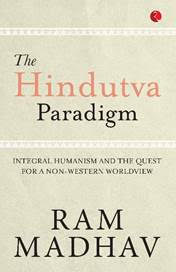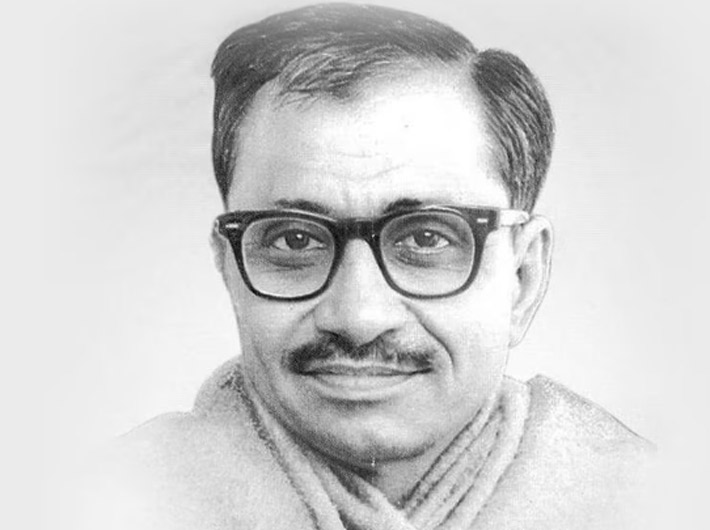An excerpt from ‘The Hindutva Paradigm: Integral Humanism and the Quest for a Non-Western Worldview’
The Hindutva Paradigm: Integral Humanism and the Quest for a Non-Western Worldview
By Ram Madhav
Rupa Publications, Rs 395, 440 pages
 Dr Ram Madhav, president of India Foundation (IF), a New Delhi-based think tank, who has served as the National General Secretary of the BJP during 2014–20, is also well-known as author and columnist. He has over 300 publications to his credit in English and Telugu, and has been a regular contributor to newspapers and magazines. Some of his recent columns have been compiled into books as well.
Dr Ram Madhav, president of India Foundation (IF), a New Delhi-based think tank, who has served as the National General Secretary of the BJP during 2014–20, is also well-known as author and columnist. He has over 300 publications to his credit in English and Telugu, and has been a regular contributor to newspapers and magazines. Some of his recent columns have been compiled into books as well.
‘The Hindutva Paradigm: Integral Humanism and the Quest for a Non-Western Worldview’, however, is not a collection of occasional writings. Here Dr Madhav explains the vision of Deen Dayal Upadhayaya, co-founder of the Bharatiya Jana Sangh (the predecessor of the BJP) and an original political thinker.
Upadhyaya articulated a coherent economic philosophy, at the core of which was human-centric development, and this book argues that global governance can benefit from it as it needs fresh ideas and novel institutions to respond to altered actualities of the twenty-first century.
In ‘The Hindutva Paradigm’, Dr Madhav provides clarifying insights into the reasoning of a philosopher who has remained an enigma through the decades.
Here is an excerpt from a crucial chapter, titled ‘Chiti, the National Soul, and Virat, the National Life-Force’, working through two critical concepts in Upadhyaya’s works:
Cultural Nationalism in India
India offers a classic example of a unique culture that has contributed to shaping its national life. Its view of everything—people, morals, social order, environment—is distinctly different from that of the rest of the nations in the world. Even in being different, it has its uniqueness which was aptly described by Swami Vivekananda while addressing the World Parliament of Religions in 1893. ‘I am proud to belong to a religion which has taught the world both tolerance and universal acceptance. We believe not only in universal toleration, but we accept all religions as true,’ he exhorted. At a time when the world was discussing the virtues of tolerance, Swami Vivekananda stood up to tell the world that India, in its thinking, didn’t stop at tolerance alone. Tolerance has an element of arrogance in it. ‘I am superior, yet I tolerate your inferior being’, was how the Semitic religions had presented the concept of tolerance at that time. But Indian cultural experience has been not only about tolerance, but acceptance and validation of all the different religions and thought processes as true; and to further celebrate this diversity.
Many Western scholars too have acknowledged and appreciated this uniqueness in Indian culture. Michael Wood, a famous British historian, had said, ‘India was one of the earliest of the great civilizations and it defined the goals of civilized life very differently from the West. The West raised individualism, materialism, rationality, [and] masculinity as it ideals. India’s great tradition insisted on non-violence, renunciation, the inner life, [and] the female as pillars of civilization. And through all the triumphs and disasters of her history she hung on to that ideal, an eternal quest to identify humanity with the whole of creation, a unity in diversity … History is full of empires of the sword but India alone created an empire of the spirit.’
Margaret Elizabeth Noble was an Irish woman who met Swami Vivekananda in 1895 at London and became his disciple. She later arrived in India in 1898 and became a monk. Swami Vivekananda gave her a spiritual name as Bhagini (Sister) Nivedita. Her scholarship and depth of understanding about India and Hinduism was in no way inferior to that of her guru. In one of her speeches, she had raised an interesting question to highlight the cultural uniqueness of India. ‘Had Niagara been situated on the Ganges, it is odd to think how different would have been its valuation by humanity,’ she stated, and went on to say, ‘Instead of fashionable picnics and railway pleasure trips, the yearly or monthly incursion of worshipping crowds. Instead of hotels, temples. Instead of ostentatious excess, austerity. Instead of the desire to harness its mighty forces to the chariot of human utility, the unrestrainable longing to throw away the body, and realise at once the ecstatic madness of Supreme Union. Could contrast be greater?’
‘The life of spirit’ that Nivedita talked about was what Deen Dayal [Upadhyaya] described as the ‘Chiti’, inner soul, of India. Events in India’s past reflect the manifestation of this inner soul. The Chinese had built the Great Wall over a period starting from seventh century BCE. Chinese history claims that it took 1,600 years and hundreds of emperors to build this wall and its supposed length varies from 8,000 km to 21,000 km. The ostensible reason given for building such a mammoth wall was to protect Chinese empires from the aggressions of nomads from the north. If we look at Indian history, all major invasions into India happened through one major mountain pass called the Khyber Pass. Why did it not occur to any Indian king to close the pass by building a wall across it? The ethos of India, its belief in the dictum ‘Vasudhaiva Kutumbakam’—the entire world is but one family—doesn’t allow the idea of shutting off from the rest of the world. Not until recently did India consider sealing its borders on some fronts.
‘All warfare is based on deception,’ declared ancient Chinese general and strategist Sun Tzu in his acclaimed treatise, ‘The Art of War’. Deception and cunning were integral to warfare, according to him. On the other hand, in India, the epic Bhagavad Gita that discusses the philosophy of war through the Mahabharata, begins with a verse ‘Dharma Kshetre Kuru Kshetre’. It describes the battlefield of Kuru as ‘Dharma Kshetra’, meaning ‘a field of righteousness’.
The decision of the Indian leadership to pass on the membership of the UN Security Council to China despite it being offered to India; or its refusal to take over the Gwadar port from Oman when the Emir wanted to sell it to India—while these actions attracted genuine criticism, they also demonstrated the specific cultural trait of the country. Even in day-to-day life, even in the remotest of villages and the poorest of families, the day will most likely start with prayer to rivers and nature and end with ‘Lok Kalyan ho’—Let there be glory to mankind. Not about self, nor family, nor caste, nor country, but the well-being of all of humanity. This is the manifestation of Chiti in the daily life of an average Indian.
[The excerpt reproduced with the permission of the publishers.]
